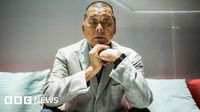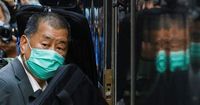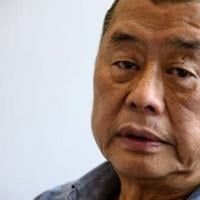In Hong Kong, the fate of pro-democracy media tycoon Jimmy Lai, a figure both celebrated and reviled, hangs in the balance as his landmark national security trial enters its final stage. The 77-year-old British citizen, founder of the now-shuttered Apple Daily newspaper, faces charges of colluding with foreign forces and seditious publication under a Beijing-imposed law that has fundamentally altered the city’s political landscape. The trial, which began in December 2023, has become a lightning rod for international attention, drawing calls for Lai’s release from Western leaders and rights groups even as Hong Kong’s authorities dig in their heels.
The closing arguments, originally set for Thursday, August 14, 2025, have been repeatedly postponed—first by a typhoon that swept through Hong Kong, and then by concerns about Lai’s deteriorating health. On Friday, August 15, a judge ordered the installation of a medical device to monitor Lai’s heart after his defense lawyer, Robert Pang, told the court that Lai was experiencing heart palpitations and fatigue. "Coming to court fatigues him," Pang said, adding that Lai felt as if he was "collapsing." Although prison medical staff reported no abnormality, they arranged for a wearable monitor and medication as a precaution, with Judge Alex Lee deciding it would be "prudent" to resume proceedings on Monday, August 18.
Lai’s frail appearance in court—noticeably thinner, according to BBC—has only heightened concerns. His lawyers and his son, Sebastien Lai, have been outspoken about his declining health over the past year. Sebastien has traveled the world to campaign for his father’s release, warning that even a five-year sentence would be "practically the same as a death penalty" given Lai’s age and fragile condition. "Given his age, given his health, yeah. He will die in prison," Sebastien told the BBC. He has also argued that the case is "crucial for China-UK relations," stating, "as a nation [the UK] we didn't stand up for one of our bravest when it mattered" if his father were to die behind bars.
Lai’s journey from rags to riches is the stuff of legend. Born in Guangzhou to a wealthy family stripped of everything after the Communist takeover in 1949, he fled mainland China at age 12, arriving in Hong Kong as a stowaway on a fishing boat. Working odd jobs, he taught himself English and eventually founded the international clothing brand Giordano. The Tiananmen Square crackdown in 1989 transformed him from entrepreneur to activist. Outraged by Beijing’s suppression of pro-democracy demonstrators, Lai began publishing columns criticizing the massacre and soon established a publishing house that would become a bulwark of Hong Kong’s pro-democracy movement. His flagship, Apple Daily, quickly became one of the city’s most influential and outspoken newspapers.
Unlike many of his business peers, Lai openly challenged Beijing’s authority, earning him both admiration and enmity. "I'm a born rebel," he told the BBC in a 2020 interview, shortly before being charged. "I have a very rebellious character." His activism and media empire made him a hero to Hong Kong’s democracy supporters, but a traitor in the eyes of Chinese authorities. Over the years, he survived firebomb attacks on his home and offices and was even the target of an assassination plot, but these threats never silenced his criticism. He was a fixture at pro-democracy rallies and was twice arrested in 2021 for illegal assembly.
The legal battle facing Lai is unprecedented. He is the most prominent figure charged under the sweeping national security law Beijing imposed in 2020, following months of massive, sometimes violent, pro-democracy protests in 2019. The law criminalizes acts that Beijing deems subversive or secessionist—an intentionally broad definition that critics say has effectively outlawed dissent. Lai’s charges include collusion with foreign forces and seditious publication, the latter tied to 161 op-eds published under his byline. Prosecutors have presented evidence of Lai’s alleged political connections in the United States, Britain, and Taiwan, but Lai has denied ever calling for sanctions against China or Hong Kong or advocating separatism.
Western governments and rights organizations have kept a close eye on the proceedings. UK Prime Minister Keir Starmer has publicly called for Lai’s release, and former US President Donald Trump said he would do "everything [he] can" to save Lai, even raising the case with Chinese President Xi Jinping. "You could also understand President Xi would not be exactly thrilled," Trump commented on Fox News radio. The Committee to Protect Journalists issued a statement declaring, "the world is watching how Hong Kong treats its journalists."
The Hong Kong government, for its part, has pushed back hard against what it calls "slanderous remarks made by external forces" regarding Lai’s case. Officials maintain that the national security law is necessary to restore stability after the chaos of 2019, and that the rule of law remains intact. But critics, both inside and outside Hong Kong, argue that the law has been weaponized to silence political opponents and dismantle the city’s once-vibrant civil society. As AFP reported, a former Apple Daily employee surnamed Chang described Lai as a "caring" boss whose health "worsened after he was taken into custody, but I think his spirit is strong, and I hope he can persist."
The closure of Apple Daily in 2021, following police raids and the arrest of senior editors, marked a watershed moment for press freedom in Hong Kong. Lai’s own words, delivered through his publications and in interviews, underscore the stakes: in 2020, he warned that the national security law sounded the "death knell" for Hong Kong, predicting that without the rule of law, the city’s status as a global financial hub would be "totally destroyed." "I came here with nothing, the freedom of this place has given me everything... Maybe it's time I paid back for that freedom by fighting for it," Lai told AFP.
As the trial resumes, the outcome will resonate far beyond the courtroom. For supporters, Lai embodies the struggle for Hong Kong’s freedoms and the resilience of its people. For Beijing and its allies, he represents a threat to national security and order. The world, as many have noted, is indeed watching.



